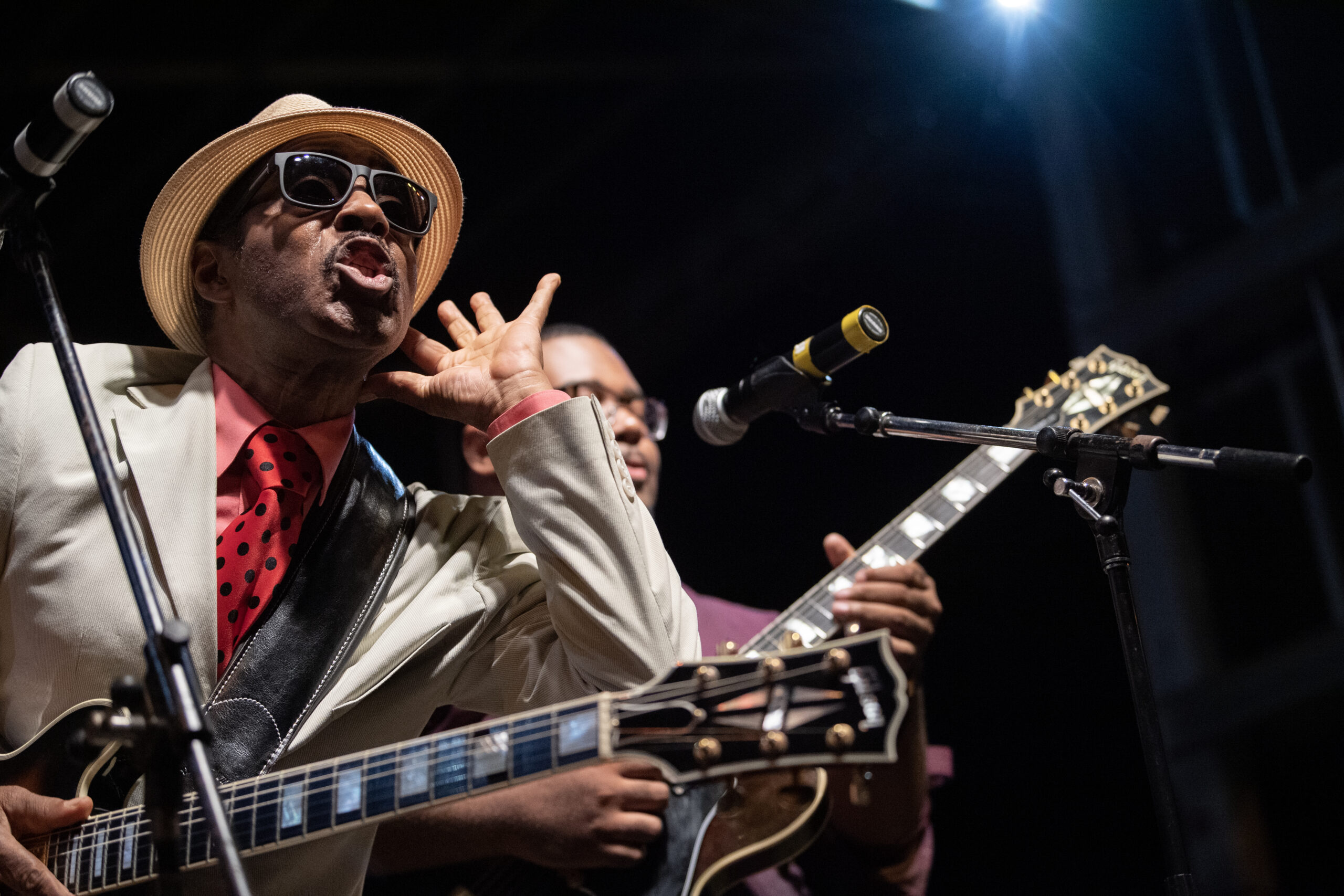A successful blues artist and arranger for decades, Jackson’s mission to preach the power of music around the world can’t be derailed.
Mississippi blues artist Vasti Jackson was only 15 or 20 minutes into watching the acclaimed 2025 Ryan Coogler film “Sinners,” set in a fictionalized version of Clarksdale, Miss., and drawing heavily on its blues history, when the familiar began to seem more than a coincidence.
But it wasn’t just the music or the setting that jogged his memory — after all, those had been the sounds and scenes of daily life for much of his 65 years. He finally made the connection after realizing the “Delta Slim” character on the movie screen was the same Delta Slim he’d auditioned for via cellphone video nearly two years earlier.
At the time, all he knew was he was reading for a potential feature film with a “big-name director.” Details were scarce, and the non-disclosure agreement he signed kept him from inquiring further. But in the theater, that coincidence turned into a confirmation.
“I grabbed my phone and searched my email, and there it was, in the emails from the casting company: Vasti Jackson, Delta Slim,” he says. “That’s how I made the connection.”
And to his surprise, his phone rang again for “Sinners” — but this time it wasn’t a casting agent, it was his protégé Keith Johnson, the great-nephew of Muddy Waters, inviting him to play Red’s juke joint in Clarksdale for Coogler and others involved with the film during its screening there in May.
“We’re at Red’s at about 10:30 in the morning, and they said, ‘We’ll give you a call when they arrive,’” he says. “About 11:30 they called and said, ‘You’re on in five minutes.’ So, we’re playing and Coogler sits down at the bar directly in front of us, and they just groove and have a good time to the music.”

For Jackson, whose latest album, Royal American Blues, recently hit streaming platforms, the brush with blockbuster fame is just another day on the gig. He’s been behind the scenes for so long, writing, arranging and performing with blues legends like Johnnie Taylor, Bobby Rush and Z.Z. Hill that his compass is completely dialed into making music.
“I’m not an act, and I’m not an entertainer,” he says. “I am just a person who is completely head-over-heels with this thing called music.”
Behind his hard-won, quiet confidence, not born of flashy headlines or viral moments, is a career in music earned by decades showing up, learning and refusing to be boxed in. For Jackson, a Mississippi-born guitarist, composer and musical director, resilience is the only way forward.
Jackson’s journey began in McComb, where music was a family inheritance. His grandfather, Sammy Jackson Sr., introduced him to the blues, while his grandmother, Mary Jackson, added gospel and country to the mix. The young Jackson soaked in these sounds, growing up in a home where music was a daily companion and a source of identity.
By age 14, Jackson was already playing in local juke joints, where he quickly got an education in how to navigate the room, adjust to the moment and hold his ground. Yet his first attempt to join his high school band met a roadblock: even though he could play, he couldn’t read music, so the band director dismissed him. But Jackson didn’t quit. Instead, he devoted himself to studying music theory and notation, returning with the skills to earn a percussion scholarship at Jackson State University.
Over the next several decades, Jackson built a reputation as a consummate sideman and arranger, working for studios like Malaco in Jackson and Alligator Records in Chicago. He helped shape the sound of Southern blues and soul while working with the aforementioned Taylor, Rush and Hill, as well as artists like Denise LaSalle and Bobby “Blue” Bland.
In the 1990s, Jackson began stepping into the spotlight himself, releasing albums that expanded on the blues tradition by fusing elements of jazz, gospel, funk and even classical music. “The blues is not all I do,” he explains. “I work with symphony orchestras. I do solo work, reggae, gospel and jazz. There’s only two kinds of music for me, and that’s good or bad.”
Jackson’s chameleonic talents carried him into theater work, where he scored the role of Hobo Bill in a stage play based on the life of country pioneer Jimmie Rodgers, as well as the demanding role of Ike Turner in the international touring production of “Simply the Best: The Tina Turner Story.” Playing Turner meant inhabiting a complex legacy on stages across Europe, a challenging but fitting role for a man unafraid of change. “I don’t mind the challenge of being put into a different context,” he says.
His reputation as a guitarist and collaborator truly reached a global scale more than a decade ago when he began collaborating with Playing For Change, an organization championed by Bono, Cher and Keith Richards and aimed at uniting the world through music. The program has taken him to places like the Saharan Desert, where he met and performed with local musicians from the M’Hamid el Ghizlane region of southern Morocco, and matched him with collaborators such as Buddy Guy, Dr. John, the Doobie Brothers and Steve Miller.
“People are in great need all over the world — Nepal, Mexico, Lebanon, the Congo, Rwanda, Brazil — and we can really see the effect of music as it ties into humanity,” he says. “We’re using music as a tool to enhance people’s lives, to spread the word of peace and brotherhood and fellowship to make the world a better place.”
His latest project for Playing For Change is a reading of Robert Johnson’s “Cross Road Blues” credited to Jackson and a coterie of influential musicians including Mississippi natives Christone “Kingfish” Ingram, Charlie Worsham and Cedric Burnside, as well as blues artist Keb’ Mo’ and bluegrass mandolin and guitar player Sierra Hull. “It’s very important to have as many Mississippi folks as we could get,” he says, a tribute to the place where Johnson and many others developed and performed the blues.
Royal American Blues reflects the diversity of music and experiences he’s witnessed during his life and travels. “It explores the blues beyond the genre in terms of the roots being just strictly an American thing,” he says. “We’ve got elements that reach all the way back to Africa with the song ‘Voodoo Boogie,’ in terms of the rhythmic concept of it. It’s just a very open, explorative record.”
Recognition has followed his successes, though Jackson remains measured about it. He was inducted into the Mississippi Musicians Hall of Fame in 2012 and appointed Mississippi Cultural Ambassador in 2014. But awards and honors are secondary to the work itself. “By God’s grace, mercy and favor, people around the world find value in what I do or what I contribute,” he says. “I’m a servant. A tourist.”
When the COVID pandemic tested every musician’s resilience, Jackson was no exception. With live shows shuttered, he didn’t stop. Instead, he traveled to Ghana and Rwanda to teach and perform, later playing a four-week residency of “Simply the Best” at Germany’s Estrel Theater where audiences were small but eager under strict health protocols.
“Music is so big, and it’s so wonderful, and it’s so limitless that I can never be bored with it,” he says. “And that doesn’t mean I have to have an audience. I love music as much when there’s no one around but me as I do in front of 50,000 people.”

Or, perhaps, when he’s playing guitar with 8,000 other musicians. He traveled to Wrocław, Poland, to set a Guinness World Record for the largest guitar ensemble by performing Jimi Hendrix’s “Hey Joe” in unison. He has accomplished the feat twice while jamming alongside guitar legends like Steve Vai.
But Jackson’s story isn’t about a single moment of breakthrough or dramatic comeback. It’s about endurance — the daily choice to show up, to learn, to evolve. Learning to read music after being told he couldn’t. Building a solo career after decades behind others. Remaining relevant without chasing trends. Following the music wherever it leads, from Mississippi’s juke joints to symphony halls in Europe, from studio sessions to record-breaking global festivals.
In the pursuit of his craft lies his true legacy — a quiet, steadfast resilience that has made him one of Mississippi’s most enduring musical ambassadors, and a musician whose story is still unfolding. And Jackson is careful not to rush the journey.
“Sometimes God just gives me something and it’s purely a gift,” he says. “There are other things I have to work at, invest more time and energy into, but that’s okay because life is incremental.
“Sometimes it takes 50 steps as opposed to five steps,” he adds. “The 50 steps aren’t difficult. It’s just more steps.”



